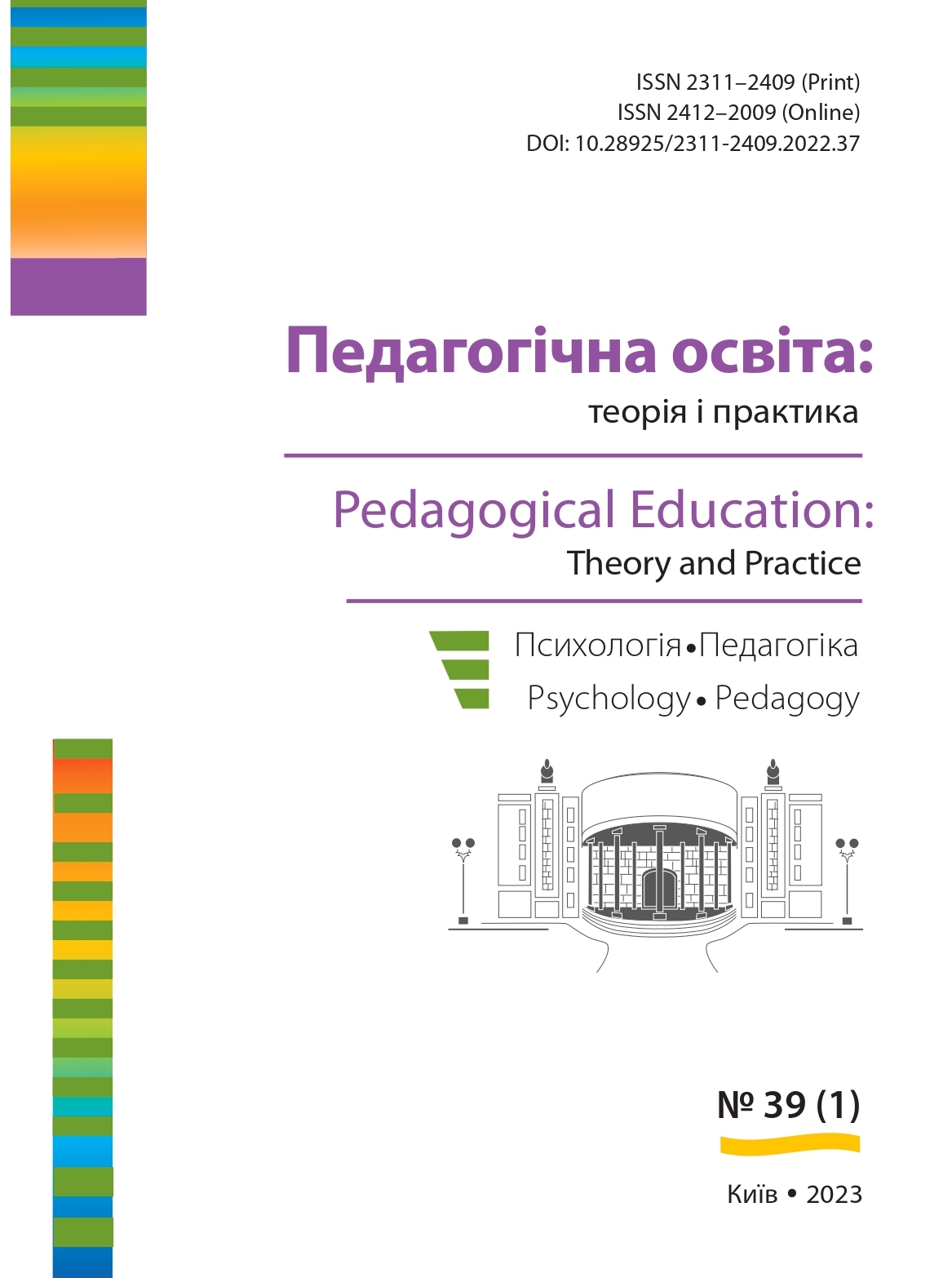Model of innovative personality: structural and dynamic approach
DOI:
https://doi.org/10.28925/2311-2409.2023.392Abstract
The relevance of the presented article is determined by the globalization and European integration
transformations of modern society, in which innovation becomes an essential feature of all its spheres, which
objectively determines the necessity and expediency of innovative reformation of higher education, as one
of the basic social institutions, which is the surface of formation of an innovative personality. The purpose
of the article is to develop a model of an innovative personality based on the positions of the structural-dynamic
approach. The tasks consist in the definition and analysis of thorough theoretical positions, the essence and
structure of the innovative personality, the dynamics of certain components and their presentation in the form
of a model. The initial basic phenomena of the article are analysed, which are: “innovations”, “model”. A scientific
thesaurus of the problem of the subject of innovation is given, represented by such concepts as: “innovator”,
“innovative personality”, “innovative type personality”, “innovatively oriented personality”. The etymology
of the concept of “innovative personality” is revealed. The concepts in which this concept appeared for the first
time were analysed, namely: the theory of social changes, the concept of polar dichotomies (sociology
of changes). An overview of studies that consider the problem of an innovative personality from an aspect
is presented. The model of an innovative personality is represented, which contains innovative orientation (a set
of motives, needs, values, attitudes), innovative-cognitive (synthesis of innovative knowledge, cognitive style,
cognitive activity), innovative-praxeological (complex of innovative skills and innovative behaviour), reflexiveprognostic
components (innovative and reflective qualities and innovative potential). It was concluded that
an innovative personality is a product and subject of the modern information society. It is fundamentally different
from the personality syndromes of pre-informational civilizations and is the main resource for the success
of modern society.
Downloads
References
Боковець О. І. Cоціально-психологічні умови розвитку інноваційного потенціалу студентів за-
кладу вищої технічної освіти : дис. … д-ра філософії : 053 — психологія. Київ, 2021. 294 с.
Гончарова О., Тараненко Г. Інноваційна діяльність особистості як важлива умова гармоніза-
ції культурно-освітнього простору: філософсько-освітній аспект. Філософські обрії. 2016. № 35.
С.162–173.
Губенко О. В. Теоретико-методологічні основи дослідження психологічних механізмів творчої
діяльності (інтегративний підхід): монографія. Київ, 2019. 400 с.
Желанова В. В. Контекстне навчання майбутнього вчителя початкових класів: теорія та техно-
логія : монографія. Луганськ : Вид-во «ЛНУ імені Тараса Шевченка», 2013. 505 с.
Рубанець О.М. Когнітивна активність особистості. Мультиверсум. Філософський альманах.
Випуск 9–10 (147–148) С. 99–107.
Словник української мови: в 11 томах. Том 6, 1975. Стор. 637.
Соціологія: короткий енциклопедичний словник. За заг. ред. В.І. Воловича. К. : Укр. центр духо-
вної культури, 1998. 736 с.
Шумпетер Й. А. Теорія економічного розвитку : Дослідження прибутків, капіталу, кредиту, від-
сотка та економічного циклу. К. : Вид. дім «Києво-Могил. акад.», 2011. 242 с.
Barnett H. Innovation: The Basis of Cultural Change. New York, 1963. 462 p.
Bloom В. Handbook on formative and summative evaluation of student learning. Hastings, Madaus,
923 p.
Hagen, Everett. On the Theory of Social Change. Homewood, IL: Dorsey Press, 1962. 127 p.
Harrison Y., Horne J.A. One Night of Sleep Loss Impairs Innovative Thinking and Flexible Decision
Making. Organizational Behavior and Human Decision Processes. 1999. № 2. P. 128–145.
Rogers E. Diffusion of innovation. San Fransisco : Free Press, 1983. 341 р.
Sztompka Piotr. The sociology of social change. Oxford, UK; Cambridge, Mass.: Blackwell, 1994. 348 p.
REFERENCES
Bokovets, O. I. (2021). Cotsialno-psykholohichni umovy rozvytku innovatsiinoho potentsialu studentiv
zakladu vyshchoi tekhnichnoi osvity [Socio-psychological conditions for the development of innovative
potential of students of a higher technical education institution]. Kandydats`ka dysertatsiia [Candidate`s
dissertation]. Kyiv (in Ukrainian).
Honcharova, O., Taranenko, H. (2016). Innovatsiina diialnist osobystosti yak vazhlyva umova
harmonizatsii kulturno-osvitnoho prostoru: filosofsko-osvitnii aspect [Innovative activity of the individual
as an important condition for the harmonization of cultural and educational space: philosophical and
educational aspect]. Filosofski obrii [Philosophical horizons], 35, 162 — 173 (in Ukrainian).
Hubenko, O.V. (2019). Teoretyko-metodolohichni osnovy doslidzhennia psykholohichnykh mekhanizmiv
tvorchoi diialnosti (intehratyvnyi pidkhid) monohrafiia [Theoretical and methodological foundations
of the study of psychological mechanisms of creative activity (integrative approach): monograph]. Kyiv
[in Ukrainian].
Rubanets, O.M. (2015). Kohnityvna aktyvnist osobystosti [Cognitive activity of the individual].
Multyversum. Filosofskyi almanakh, 9–10 (147–148), 99–107 (in Ukrainian).
Shumpeter, Y. A (2011). Teoriia ekonomichnoho rozvytku : Doslidzhennia prybutkiv, kapitalu, kredytu,
vidsotka ta ekonomichnoho tsyklu [Theory of economic development: Study of profits, capital, credit, interest
and the economic cycle]. K. : Vyd. dim «Kyievo-Mohyl. akad.» (in Ukrainian).
Slovnyk ukrainskoi movy [Dictionary of the Ukrainian language] (1975). (Vol. 6). Kyiv: Naukova
dumka (in Ukrainian).
Volovych, V.I. (Ed). (1998). Sotsiolohiia: korotkyi entsyklopedychnyi slovnyk [Sociology: a short
encyclopedic dictionary]. K. : Ukr. tsentr dukhovnoi kultury (in Ukrainian).
Zhelanova, V. V. (2013). Kontekstne navchannia maibutnoho vchytelia pochatkovykh klasiv: teoriia
ta tekhnolohiia: monohrafiia [Contextual training of future primary school teachers: theory and technology:
monograph]. Luhansk : Vyd-vo «LNU imeni Tarasa Shevchenka» (in Ukrainian).
Barnett, H. (1963). Innovation: The Basis of Cultural Change. New York.
Bloom В. (1971). Handbook on formative and summative evaluation of student learning. Hastings,
Madaus.
Hagen, Everett (1962). On the Theory of Social Change. Homewood, IL: Dorsey Press.
Harrison Y., Horne J.A. (1999). One Night of Sleep Loss Impairs Innovative Thinking and Flexible
Decision Making. Organizational Behavior and Human Decision Processes, 2, 128–145.
Rogers, E. (1983). Diffusion of innovation. San Fransisco : Free Press.
Sztompka, Piotr. (1994). The sociology of social change. Oxford, UK; Cambridge, Mass.: Blackwell.

